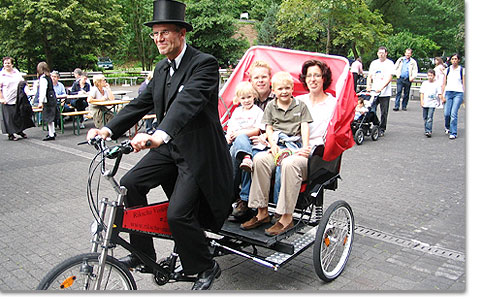
|
| Jornada de peregrinación familiar en Schoenstatt: una fiesta de verano, con ofertas de encontrase a gusto Dayfor families in Schoenstatt, with a high degree of offerings to relax and enjoy Wohlfühlzeit für Ehepaare und Familien auf der Rikscha während dem Familienwallfahrtstag in Schönstatt Foto: T.Brehm © 2007 |
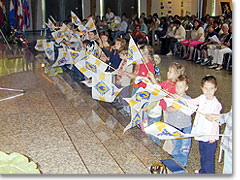 |
|
| Santa Misa en la Iglesia de Peregrinos con participación de los niños Holy Mass in the Pilgrims’ Church with participation of the children Familiengottesdienst in der Pilgerkirche mit aktiver Beteiligung der Kinder ... |
|
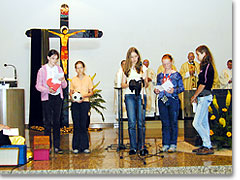 |
|
| ...y de los jovenes ... and of the young people ... und Jugendlichen |
|
 |
|
| Panel con el matrimonio Braun, el P Elmar Busse y el matrimonio Thießen Panel with the Brown’s, Father Elmar Busse, and the Thießen’s Podium mit Ehepaar Braun (l) Pater Elmar Busse (m) und Ehepaar Thießen (r) zum Thema "Wachsen statt Zerbrechen". |
|
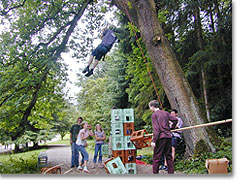 |
|
| Muchas ofertas para los niños A lot of fun for the children Vielfältiges Angebot für Kinder und Jugendliche: z.B. Kistenklettern, Menschenkicker und Spieleparcours Fotos: POS Brehm © 2007 |
|
 |
|
| Muchas ofertas para los niños A lot of fun for the children Die Kleinsten hatten Spaß auf der Hüpfburg |
|
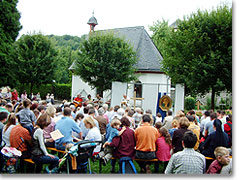 |
|
| Cierre en el Santuario Original Closing at the Original Shrine Abschluss der Familienwallfahrt am Urheiligtum Foto: Scherer © 2007 |
|
|
SCHOENSTATT, peb/mkf/ Claudia Brehm. "Instead of a pointless complaint, it is better to evaluate positively." was the basic theme of Father Busse’s message at the Pilgrim’s Church, on the occasion of the family pilgrimage that arrived at Schoenstatt on June 24th, the Feast of Saint John the Baptist. The motto for the pilgrimage was: "Living family, giving future". There were not multitudes, but for those who were there it was a beautiful family experience on a pleasant day in an atmosphere of celebration during summer at Schoenstatt.
The day began after an animated program and the celebration of Holy Mass at the Pilgrim’s Church where the children entered waving small flags.
Father Busse explained during his homily that the Church only celebrates three births liturgically: that of Jesus, Mary, and Saint John the Baptist. Celebrating a birthday means: today everything revolves around you, today you are the center of our attention. However, in this day and age it is not as evident that children receive this gift within their families. If the parents have too many problems between themselves, or if they are separated, then their children often do not receive what they really need to live happily. If the parents live in harmony and in love, then, they will have their children’s best interest by giving their children love and validation. Father Busse told of how one father always took enough time, on the eve of a birthday, to prepare a birthday cake for the child who was having a birthday. He decorated the cake himself with butter icing. He did not buy it at the bakery. How much love and validation he placed on this symbol!
The culture of pointless complaint
Today the culture of complaint is an accepted practice. The complaint, in the form of a diatribe, is different from criticism that is justified and necessary. It is a complaint that does not have a real basis, it is done because one is in a bad mood, or seeking something outside of oneself that justifies the anger, or the complaint. The pointless complaint –destructive criticism, the diatribe- is the obstinate search for the fly in the and if it is not found, then you look until you find it. Whoever criticizes in this way, is consciously or unconsciously seeking the negative – in any case in an ingenious manner- in order to make it his way of thinking and of speaking.
Positive evaluation can be like the work of an appraiser, which consists of carefully verifying the value of an object and documenting it and with this he can sell the interested party on the valuable product. There are different kinds of appraisers, such as real estate agents and stockbrokers. The owner of a house often may not realize that he has a treasure. When the seller, sees the value of his home, land, or stock objectively, the owner can be surprised to discover that he owns a treasure not previously valued correctly.
Once in a while this can also happen in a marriage: the couple becomes so accustomed to the good qualities of their spouse that they only see the defects and then they become irritated or lament about them. They no longer correctly appreciate the value of the other person. In this way to be a good salesperson means: I strive to place the value of the other person in view and in the heart. Then I can be happy for them and see the other person as a gift God has given me.
A 16-year-old boy from a family of seven children reproached his parents for his not being able to have a pair of brand name sports shoes like his companions. His school friends frequently teased him because of his ordinary sport shoes. His father made him think with this comment: "O.K. which of you should I kill so that you can buy brand name sport shoes?" The son did not want to give up any of his siblings. At that moment he matured: he understood the difference between material wealth and the wealth of family relationships. We cannot have everything at once. We should decide what is of value to us and what price we are willing to pay for it.
How good that you were born!
Only he, who understands this, can allow others to be different, without falling into the trap of feeling sorry for himself. By using the example of the appraiser, Father Elmar Busse wanted to show that you have to be aware of the value of something and then to be willing to pay the price. You are worth it!
Zacarias, the father of John the Baptist, was able to speak again and he praised
God saying: "Blessed be the Lord God of Israel, because he has visited and redeemed his people…" (Lk. 1, 68). When Mary arrived at the home of Zacarias and of Elizabeth she sang praises of the greatness and mercy of God. Both songs of praise, those of Zacarias and of Mary, are found in the Gospel of Saint Luke. They did not complain pointlessly, nor did they criticize the reality in a destructive way; rather, they manifested its beauty and what was of value. All they wanted to do was to praise God. Whoever continually complains about himself, offends his Creator. Whoever continuously complains about others diminishes his value, and he sins against truth and especially against the love of one’s neighbor.
The birth of Saint John the Baptist and the narration of how his relatives were happy about it encourages us also to say joyfully for ourselves and for other members of the family -: "it is good that you were born, we would have missed your very much! It is good that we are together, we congratulate you on your birthday". This birthday serenade" is also a song to everyone – children and adults – and to Saint John the Baptist.
I am grateful…
Father Busse ended the homily with the text from the book of Cristina Reftel, "I Have Won With You".
I am grateful…
Because I have to clean up after a celebration: that means that I have
friends.
Because I have to pay taxes: That means that I have a job.
Because my clothes are a little tight: that means that I have food.
Because I have to cut the grass, wash the windows, and clean the gutters:
that means that I have a house,
For the complaints about the politicians: that means I can express my
opinion freely.
For having to walk a long way from the parking lot: that means that I
have an auto.
For the high cost of heating: that means that I can be warm.
For the woman who is beside me and who sings out of tune: that means that
I can hear.
For the mountain of clothes on the ironing board: that means that I have
clothes to wear.
For the alarm that rings each morning: that means that I have another
day to love!
Growth
During the afternoon, a panel was held that was composed of Father Elmar Busse and two couples, the Thiessens and the Brauns. The panel discussion was about the process of growth: increase of freedom, an increase in disillusionment, and an increase in illnesses. These are subjects that lead to the nucleus of life. To see one’s own needs and not repress them, to struggle to carry them out, or to freely reach its fulfillment, Father Bussed demonstrated many vital and real life experiences about how this happens and why it is important. The Brauns contributed original examples of how to overcome disillusionments and how to grow with them. The testimony of the Brauns was impressive. Relating about the Parkinson disease that he had resulted in this summary: experiencing a crisis means that you do not remain buried in suffering; rather, it is to accept ones destiny – even when it is not easy – and to recognize and to take advantage of new possibilities. "Midnight is the beginning of a new day."
A varied program for youth and adults
There was a varied program for children and youth. The little children between the ages of 2 to 5 played in the kindergarten, they worked with small flowerpots and they planted watercress that grew rapidly. The best thing was the visit to the inflatable castle where they could jump softly and without fear, far from the "dangerous" company of older children. The 7 to 11 children made handicrafts with Sister Anngard and Sister Andrea. Very soon they understood that you can always call on God and that He sends us innumerable SMS (text messages) during the day. Through these he wants to say: "I love you. You are valuable to me. I am at your side. I am interested in everything that touches you…"
The adolescents between the ages of 12 to 15 years old gathered for a discussion group with Mrs. Lerchen. They talked about friendship and love. All of them loved it and for that reason they decided to participate in the second session with interest.
Then game time began. Each person could test their own abilities, speed and concentration at ten stations. They could fish, catch mice with cheese, ski over the grass, walk on stilts, throw rings at the porcupine, throw balls with a bulky small cannon or play bingo. Everyone found their favorite game and later he could present it. Meanwhile, those who like to climb - secured with a long alpine rope – stacked soda boxes, and in this way, meter by meter they climbed to the heights. They could only stack 15 boxes so that was the "highest peak".
Those with the most energy played a very entertaining version of soccer, while many liters of perspiration fell on the grass, the laughter of the players resound everywhere.
The afternoon attraction was a "rickshaw" a pedal, with strong driver from the 19th century (top hat, tuxedo, pocket watch). This activity was for a moment of rest for the couples, so that they could have a place for dialogue, to share about important subjects such as: what I value most about you. What I would like to endeavor with you in the future? Etc. After a while, the rickshaw for the couple was transformed into a rickshaw for families, who could take a family photo when they departed.
This is pure rest
At the end of the workshop one couple said: During the week we do not have time for ourselves. When I return from work, my wife goes out for herself and besides we are building a house. But we always come to Schoenstatt. This is an authentic rest for us. This day has also been very beneficial for us. We feel renewed and ready for the next weeks.
The family pilgrimage ended in the Original Shrine with an egg hunt about the experiences of the day and with the prayer of the litany for the family.
Translation: Celina Garza, Harlingen, TX, USA /amj